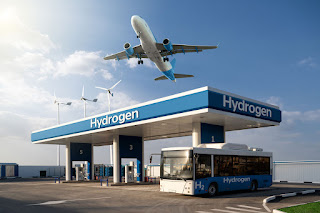Trial Success: Hydrogen Fuels Ground Operations at Bristol Airport
In a groundbreaking initiative spearheaded by easyJet and a consortium of industry partners, a pioneering airside hydrogen refuelling trial has been completed at Bristol Airport. This milestone marks the first-ever airport trial of its kind in the UK, showcasing the viability of hydrogen as a fuel source for powering ground support equipment (GSE) servicing easyJet passenger aircraft.
Named Project Acorn, the trial represents a significant step forward in the quest for sustainable aviation solutions. Over the course of a year-long development period, easyJet collaborated with a diverse array of stakeholders, including Cranfield Aerospace Solutions, Cranfield University, Connected Places Catapult (CPC), DHL Supply Chain, Fuel Cell Systems, the IAAPS research institute, Jacobs, Mulag, and TCR. This collaborative effort underscores the industry's commitment to embracing innovation and fostering eco-friendly practices.
The successful completion of the trial underscores the safety and reliability of hydrogen as a fuel source in the bustling environment of a live airport. By integrating hydrogen refuelling into its daily operations, easyJet has demonstrated the feasibility of transitioning away from traditional fossil fuels toward cleaner alternatives.
One of the key objectives of Project Acorn is to leverage the insights gained from the trial to establish industry best practices and facilitate the adoption of hydrogen infrastructure at airports nationwide. The consortium aims to provide guidance to airports, airlines, local authorities, and regulators on necessary infrastructure modifications, laying the groundwork for the widespread implementation of hydrogen technology in aviation.
Moreover, the data and findings from the trial will contribute to ongoing research initiatives, such as those led by Hydrogen in Aviation (HIA), aimed at aligning UK infrastructure, regulations, and policies with advancements in carbon-neutral flying. This collaborative approach ensures that regulatory frameworks evolve in tandem with technological innovations, ultimately supporting the aviation industry in achieving its ambitious decarbonisation targets by 2050.
David Morgan, Chief Operating Officer at easyJet, emphasised the significance of trials like Project Acorn in shaping the future of aviation. He highlighted the absence of regulatory guidance on hydrogen usage in commercial aviation, underscoring the importance of building a robust safety case backed by empirical data.
Tim Johnson, Director for Strategy, Policy, and Communications at the Civil Aviation Authority, affirmed the pivotal role of the trial in informing the development of safety guidelines and regulatory standards for hydrogen utilisation in aviation. The findings will culminate in a White Paper, providing a comprehensive framework for industry stakeholders.
Anthony Browne, Aviation Minister, commended Project Acorn as a testament to the UK aviation sector's commitment to innovation and sustainability. He emphasised the crucial role of pioneering projects in realising the ambitious objectives outlined in the Jet Zero Strategy, which aims for zero-emission airport operations by 2040.
In conclusion, the successful completion of the airside hydrogen refuelling trial at Bristol Airport marks a significant milestone in the journey toward sustainable aviation. Through collaboration, innovation, and a shared commitment to environmental stewardship, the industry is paving the way for a future where carbon-neutral flying is not just a possibility but a reality. Project Acorn serves as a beacon of progress, inspiring stakeholders across the aviation landscape to embrace transformative change in the pursuit of a greener, more sustainable future.
STOCK IMAGE




